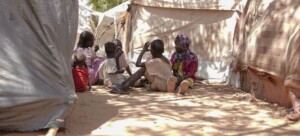Sudan cabinet takes stronger coronavirus measures
The Council of Ministers decided yesterday to take more stringent measures to control the movement of people during the lockdown. The council directed that measures be put in place that enable doctors and health personnel to obtain fuel and other necessities, so that they can focus on their work.
 People sleeping under sheets while queuing to buy cooking gas in Khartoum (Social media)
People sleeping under sheets while queuing to buy cooking gas in Khartoum (Social media)
The Council of Ministers decided yesterday to take more stringent measures to control the movement of people during the lockdown.
The council directed that measures be put in place that enable doctors and health personnel to obtain fuel and other necessities, so that they can focus on their work.
The council stressed the importance of both raising awareness in the society about the dangers of the coronavirus (Covid-19) epidemic, and dispelling rumours.
Minister of Information Feisal Mohamed Saleh said that the council discussed the problem that some people don’t follow the Khartoum lockdown directives. It was decided that driving licenses will be withdrawn from car owners that violate the measures to stop the spread of the coronavirus.
Saleh said that the Council also discussed other obstacles, such as the lack of fuel and gas which makes it difficult for people to adhere to the lockdown measures, and to enforce it.
The authorities in Khartoum locality announced repercussions for violations of the anti-coronavirus measure to prohibit selling tea and coffee in public places.
Executive Director of Khartoum locality Awatef Osman stated that recent statistics of the General Administration of Social Development show that more than 30.000 women work as tea vendors at local markets and on the streets. In these days, that is a serious health hazard, because people drink their coffee or tea near the vendors.
A report from the Ministry of Health published this morning shows that 33 new coronavirus cases have been registered, 31 in Khartoum and two in El Gezira. One of patients died. In total, 140 cases have been recorded in Sudan. 13 of them died, eight recovered.
Op-ed
At the beginning of this month, Radio Dabanga published an op-ed by Cameron Hudson, a senior fellow at the Atlantic Council Africa Centre. He stated that “given the almost total lack of testing and near-absent health care system, that figure [of confirmed cases in Sudan] is most assuredly grossly underestimated”.
“Last week alone, more than three hundred Sudanese suspected by health officials as having the virus escaped from government-administered quarantine facilities, while one hundred Sudanese nationals returning from Egypt were reportedly able to evade health screenings at the border”, he added.
He summarised that Sudan is “in perhaps one of the worst situations anywhere in the world to mobilize an effective national response because of grinding poverty, lack of household savings to offset lost income, lack of access to clean water, proper sanitation, and health supplies, and millions living in displaced persons camps across Darfur and the Two Areas where Covid-19 could rip through with devastating effect.”
Radio Dabanga’s editorial independence means that we can continue to provide factual updates about political developments to Sudanese and international actors, educate people about how to avoid outbreaks of infectious diseases, and provide a window to the world for those in all corners of Sudan. Support Radio Dabanga for as little as €2.50, the equivalent of a cup of coffee.












 and then
and then